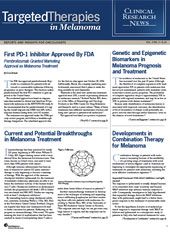Developments in Combination Therapy for Melanoma
Scientists are beginning to find that combination therapy improves outcomes for patients, particularly with ipilimumab-nivolumab combination therapy.
Figure 1. Unmasking immune response with checkpoint inhibitors.
Adapted from: http://www.novartisoncology.us/assets/Products_in_Development. pdf. Accessed March 10, 2014.
Sequential Treatment With BRAF Inhibitors and Ipilimumab
Figures 1 and 2). Scientists are beginning to investigate the appropriate sequencing of treatments for patients with melanoma, including the most effective combination regimens.1-5The response to ipilimumab is usually delayed because of its somewhat slow onset of activity and because BRAF inhibitors may enhance immune response to cells. Consequently, investigators in Italy hypothesized that sequential therapy, first with BRAF inhibitors, then with ipilimumab, might lead to a better therapeutic response in the treatment of unresectable melanoma.1
To test the hypothesis, Ascierto et al analyzed patients’ response to sequential therapy with BRAF inhibitors and ipilimumab in a retrospective study of patients in Italy who had received treatment for unresectable melanoma at 55 centers across Italy.1
Of the 93 patients analyzed, patients received sequential treatment with 1 of 2 available BRAF inhibitors (vemurafenib 960 mg twice daily or dabrafenib 150 mg twice daily), and ipilimumab at a dose of 3 mg/kg every 3 weeks for a total of 4 doses.1
Approximately half of patients (n = 45) received BRAF inhibitor therapy followed by ipilimumab therapy. The remaining patients (n = 48) received ipilimumab therapy followed by BRAF inhibitor therapy.1
Figure 2. BRAF and MEK inhibitor pathway.
Adapted from: http://www.novartisoncology.us/assets/Products_in_Development. pdf. Accessed March 10, 2014.
Patient groups were heterogeneous because patients with poor prognostic indicators (ie, elevated lactate dehydrogenase,P= .03; or brain metastases,P= .006) were more common in the group treated with BRAF inhibitors as initial therapy. This may explain why overall survival (OS) was significantly longer (P= .04) in patients treated with ipilimumab therapy initially (median OS: 14.5 months) versus patients treated with BRAF inhibitors initially (median OS: 9.9 months).1
Combination Treatment With Ipilimumab and Nivolumab
Although more research is required, these preliminary retrospective results suggest that therapy with ipilimumab followed by BRAF inhibitors may be a more appropriate course of action than administering a BRAF inhibitor as initial therapy and reserving ipilimumab treatment as a next-line treatment after progression of disease.1In a trial by Sznol et al, 53 patients with advanced metastatic melanoma received treatment with the antiPD-1 nivolumab and the cytotoxic T-lymphocyte antigen 4 (CTLA-4) inhibitor ipilimumab. Patients initially received 12 weeks of treatment with nivolumab and ipilimumab, followed by 12 weeks of treatment with nivolumab alone. A total of 4 dosage regimens were tested. In aggregate, including data from all doses used, overall survival at 1 year was 82%, and after 2 years was 75%. In addition, after 36 weeks of treatment, more than one-third (42%) of patients experienced an 80% or greater reduction in tumor burden.2
Summary
Results of this trial were used to select an appropriate dosage regimen for further investigation (nivolumab at a dose of 1 mg/kg plus ipilimumab at a dose of 3 mg/kg administered concurrently every 3 weeks for a total of 4 doses, followed by nivolumab at a dose of 3 mg/kg every 2 weeks thereafter). In patients receiving this dosage, overall survival was 94% after 1 year. Further clinical investigation in phase II and phase III trials will employ this dosage regimen.2With the availability of BRAF inhibitors, CTLA-4 inhibitors, and the expected near-term approval of agents active against PD-1, the treatment of melanoma with combination regimens is an area of strong clinical interest. Scientists are beginning to find that combination therapy improves outcomes for patients, particularly with ipilimumab-nivolumab combination therapy. More investigation is required in the area of combination therapy before these treatment modalities are ready for the clinic, but initial results warrant cautious optimism.
References
- Ascierto PA, Simeone E, Sileni VC, et al. Sequential treatment with ipilimumab and BRAF inhibitors in patients with metastatic melanoma: data from the Italian cohort of the ipilimumab expanded access program. Cancer Invest. 2014;32(4):144-149.
- Sznol M, Kluger HM, Callahan MK, et al. Survival, response duration, and activity by BRAF mutation (MT) status of nivolumab (NIVO, anti-PD-1, BMS-936558, ONO-4538) and ipilimumab (IPI) concurrent therapy in advanced melanoma (MEL). Presented at the Annual Meeting of ASCO, June 2, 2014. Abstract LBA9003.
- Barker CA, Postow MA. Combinations of radiation therapy and immunotherapy for melanoma: a review of clinical outcomes. Int J Radiat Oncol Biol Phys. 2014;88(5):986-997.
- Hodi FS, O’Day SJ, McDermott DF, et al. Improved survival with ipilimumab in patients with metastatic melanoma. N Engl J Med. 2010;363(8):711-723.
- Robert C, Thomas L, Bondarenko I, et al. Ipilimumab plus dacarbazine for previously untreated metastatic melanoma. N Engl J Med. 2011;364(26):2517-2526.
Survivorship Care Promotes Evidence-Based Approaches for Quality of Life and Beyond
March 21st 2025Frank J. Penedo, PhD, explains the challenges of survivorship care for patients with cancer and how he implements programs to support patients’ emotional, physical, and practical needs.
Read More
